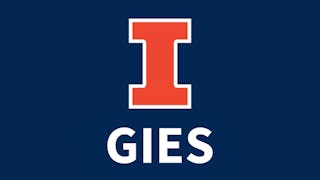Filter by
SubjectRequired
LanguageRequired
The language used throughout the course, in both instruction and assessments.
Learning ProductRequired
LevelRequired
DurationRequired
SkillsRequired
SubtitlesRequired
EducatorRequired
Results for "resource allocation"
 Status: Free Trial
Status: Free TrialUniversity of Minnesota
Skills you'll gain: Enterprise Resource Planning, Business Systems Analysis, Systems Analysis, Requirements Analysis, Cybersecurity, Business Requirements, Business Systems, Cloud Computing, Cloud Services, IT Management, Change Management, Information Technology, Organizational Change, Technology Strategies, Process Flow Diagrams, System Implementation, User Requirements Documents, Data Modeling, Enterprise Architecture, Portfolio Management

Coursera Instructor Network
Skills you'll gain: Performance Appraisal, Human Resource Strategy, Human Resources, Compensation Strategy, Talent Management, Compensation Management, Performance Management, Organizational Development, Employee Engagement, Workforce Development, Talent Acquisition, Employee Retention
 Status: Free Trial
Status: Free TrialUniversity of Pennsylvania
Skills you'll gain: Environmental Social And Corporate Governance (ESG), Risk Management, Business Risk Management, Stakeholder Management, Corporate Sustainability, Governance, Portfolio Management, Diversity and Inclusion, Corporate Strategy, Waste Minimization, Environmental Issue, Investments, Business Ethics, Investment Management, Crisis Management, Insurance, Return On Investment, Environmental Resource Management, Financial Analysis, Product Lifecycle Management
 Status: Free Trial
Status: Free TrialSkills you'll gain: Stakeholder Engagement, Software Development Life Cycle, Software Architecture, Agile Software Development, Project Management Life Cycle, Resource Management, Risk Management, Peer Review, Earned Value Management, Stakeholder Management, Agile Methodology, Project Risk Management, Team Motivation, Software Design, Kanban Principles, Project Schedules, Information Technology, Sprint Retrospectives, Interviewing Skills, Project Management
 Status: Free Trial
Status: Free TrialUniversity of Illinois Urbana-Champaign
Skills you'll gain: Business Strategy, Organizational Change, Stakeholder Management, Organizational Structure, Corporate Strategy, Governance, Conflict Management, Organizational Strategy, Trustworthiness, Team Building, Strategic Leadership, Organizational Leadership, Business Management, Organizational Effectiveness, Business Ethics, Team Management, Change Management, Decision Making, Leadership Development, Teamwork
 Status: Free Trial
Status: Free TrialJohns Hopkins University
Skills you'll gain: Biostatistics, Statistical Hypothesis Testing, Regression Analysis, Sampling (Statistics), Statistical Methods, Statistical Visualization, Statistical Analysis, Epidemiology, Medical Science and Research, Quantitative Research, Descriptive Statistics, Research Design, Statistical Inference, Probability Distribution, Scientific Methods, Data Analysis, Public Health, Probability & Statistics, Advanced Analytics, Statistical Modeling
 Status: Free Trial
Status: Free TrialSkills you'll gain: Stakeholder Engagement, Agile Software Development, Project Management Life Cycle, Resource Management, Risk Management, Peer Review, Earned Value Management, Stakeholder Management, Agile Methodology, Project Risk Management, Team Motivation, Kanban Principles, Project Schedules, Resource Planning, Project Management Institute (PMI) Methodology, Stakeholder Communications, Project Management, IT Management, Interviewing Skills, Professional Networking
 Status: Free Trial
Status: Free TrialUniversity of Minnesota
Skills you'll gain: Enterprise Resource Planning, Business Systems, Change Management, Organizational Change, System Implementation, Business Process, Business Management, Business, Project Design, Business Strategy
 Status: Free Trial
Status: Free TrialDuke University
Skills you'll gain: Deductive Reasoning, Logical Reasoning, Computational Logic, Probability, Sampling (Statistics), Persuasive Communication, Research, Writing, Statistics, Scientific Methods, Oral Expression, Correlation Analysis, Interpersonal Communications, Interactive Learning, Learning Strategies, Instructional Strategies
 Status: Free Trial
Status: Free TrialUniversity of Alberta
Skills you'll gain: Reinforcement Learning, Machine Learning, Sampling (Statistics), Machine Learning Algorithms, Artificial Intelligence, Deep Learning, Simulations, Solution Architecture, Artificial Intelligence and Machine Learning (AI/ML), Markov Model, Supervised Learning, Algorithms, Performance Testing, Artificial Neural Networks, Pseudocode, Linear Algebra, Probability Distribution, Debugging
 Status: Free Trial
Status: Free TrialUniversity of California, Irvine
Skills you'll gain: Cost Estimation, Stakeholder Management, Project Risk Management, Project Controls, Project Schedules, Work Breakdown Structure, Project Performance, Estimation, Conflict Management, Quality Management, Change Control, Project Management, Timelines, Milestones (Project Management), Project Planning, Peer Review, Budgeting, Scheduling, Project Management Life Cycle, Risk Analysis
 Status: Free Trial
Status: Free TrialUniversity of Pennsylvania
Skills you'll gain: People Analytics, Data-Driven Decision-Making, Business Analytics, Descriptive Analytics, Business Intelligence, Human Resource Strategy, Financial Data, Marketing Analytics, Analytics, Talent Management, Financial Analysis, Predictive Analytics, Peer Review, Business Analysis, Financial Statement Analysis, Financial Forecasting, Customer Insights, Workforce Planning, Demand Planning, Customer Analysis
In summary, here are 10 of our most popular resource allocation courses
- Information Systems: University of Minnesota
- Strategic HRM: Talent, Performance, Compensation Design: Coursera Instructor Network
- The Materiality of ESG Factors: University of Pennsylvania
- IBM IT Project Manager: IBM
- Strategic Leadership and Management: University of Illinois Urbana-Champaign
- Biostatistics in Public Health: Johns Hopkins University
- IBM Project Manager: IBM
- Enterprise Systems: University of Minnesota
- Introduction to Logic and Critical Thinking: Duke University
- Reinforcement Learning: University of Alberta










